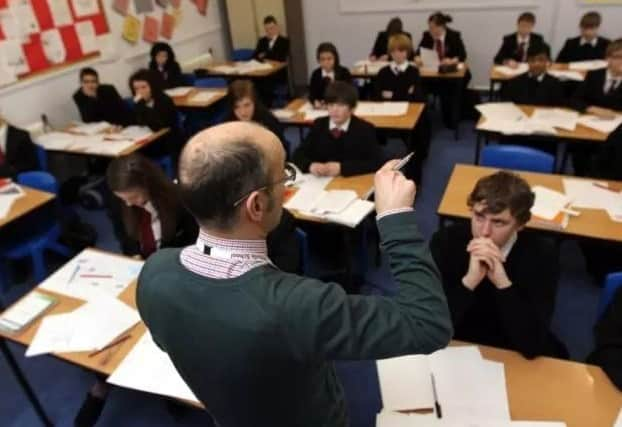Wigan schools 'struggling to cope' as Freedom of Information request reveals a massive rise in the number of pupils with special educational needs
and live on Freeview channel 276
A Freedom of Information request put in by Wigan Today found the local authority currently maintains 2,655 pupils on an Education, Health and Care Plan (EHCP), compared with just 1,008 in 2016 - more than double the number.
EHCPs are packages put together to support children assessed as having additional needs or special educational needs.
Advertisement
Hide AdAdvertisement
Hide AdThe categories which have seen the biggest growth are: Autism Spectrum Condition (ASC) from 568 to 1,058; social, emotional & mental health difficulties (SEMH) from 1,797 to 2,524; and speech, language and communication needs (SLCN) from 1,505 to 2,475.


The FOI request revealed that, between January 1, 2022 and April 3, 2023, Wigan Council had received a total of 815 new requests for EHC Needs Assessments.
This is based on both parental and professional referrals, and it is anticipated that the majority of these learners will have had their SEN formally recognised by their named school / setting and have been placed on the SEN register.
Of the 2,655 EHCPs currently maintained, the breakdown of primary category of need is as follows:


• Autism Spectrum Condition – 710
• SEMH – 693
• Speech, Language and Communication- 387
• Severe Learning Disability – 309


• Moderate Learning Disability – 305
• Physical Disability – 83
• Specific Learning Difficulty – 33
• Hearing Impairment – 31
• Profound and Multiple Learning Disability – 30
• Medical Needs – 24
• Visual Impairment -24
• Unknown – 20
Advertisement
Hide AdAdvertisement
Hide AdNot all children with special educational needs have an EHCP. There are around 8,562 children that are identified as having a SEN but do not have an EHCP. In 2018 this number was 7,081.
A Wigan Council spokesperson said: “We are continuing to work closely with our schools and our families to identify need at the earliest opportunity and to put in place the right resources and provision to meet these needs.
“However, appropriate funding remains a challenge both for schools and the local authority. Whilst we have welcomed increases to high needs over the last few years, this has not increased in line with the demand and need we are experiencing.”
After the findings of the FOI request were revealed, Max Atkins, the joint district secretary of Wigan NEU, said: “We witness first-hand the struggles schools have with this issue.
Advertisement
Hide AdAdvertisement
Hide Ad“The local authority is correct - there is never enough money to fund such plans, no matter how often, how many or how earnest the appeals are to have this increased.
“Our current dispute with the government is for identical reasons highlighted by this FOI request - they think there is no need to fully-fund as many EHCPs as are needed because schools have funds they can use to cover them all, which is simply untrue.
“Numbers have risen dramatically post-Covid, something else this government fails to recognise by not giving local authorities funds that at least keep up with this extra demand - and inflation.
“As a result, many of those pupils in desperate need of support are being deprived equal access to the curriculum and the ability to achieve academic success. This in turn can lead to a lifetime of perceived failure and feelings of worthlessness, and that is criminal.
Advertisement
Hide AdAdvertisement
Hide Ad“This government needs to wake up to the crisis facing education at every level, and hand over the funds needed to enable schools to give every child the education they deserve.”
Karen Parkin, who is also joint district secretary of Wigan NEU, added: “Educators are now better able to determine where a child has a Special Educational Need or Disability and sometimes, those children require an EHC Plan. This plan will contain details of any extra support that the child will need from the teacher and from teaching assistants. As well as this increase in diagnoses, the Covid pandemic has compounded the mental health crisis in our schools and there are now more children and young people than ever who need extra help.
“Unfortunately, the Government funding required for this extra help has failed to keep pace with the escalation in need. As schools continue to suffer from chronic underfunding, we are losing support staff who are leaving to take better paid jobs and who are then not being replaced. During restructures of workplaces, it is usually the support staff jobs that are the first to be cut. This impacts every classroom; every day and remaining staff are stretched beyond reasonable limits trying to counter the effects of staff shortages.”
Last month, the Government published its Special Educational Needs and Disabilities (SEND) Improvement Plan, which outlined its mission for the SEND and alternative provision system to fulfil children’s potential, build parent’s trust and provide financial sustainability. The plan aims to “improve ordinarily available mainstream provision with new national SEND and alternative provision standards, to ensure we deliver consistent experience regardless of the school a child attends, where they live or their family background.”
Advertisement
Hide AdAdvertisement
Hide AdA spokesperson for the Department for Education (DfE) said: “Every child deserves to have access to education that meets their needs. Our recent Improvement Plan will reform the support system for children with Special Educational Needs and Disabilities, prioritising earlier intervention and creating consistent high standards across the country.
“We are also putting significant investment into the high needs budget, worth £10.1bn by 2023-24, which is 50 per cent more than four years ago.”